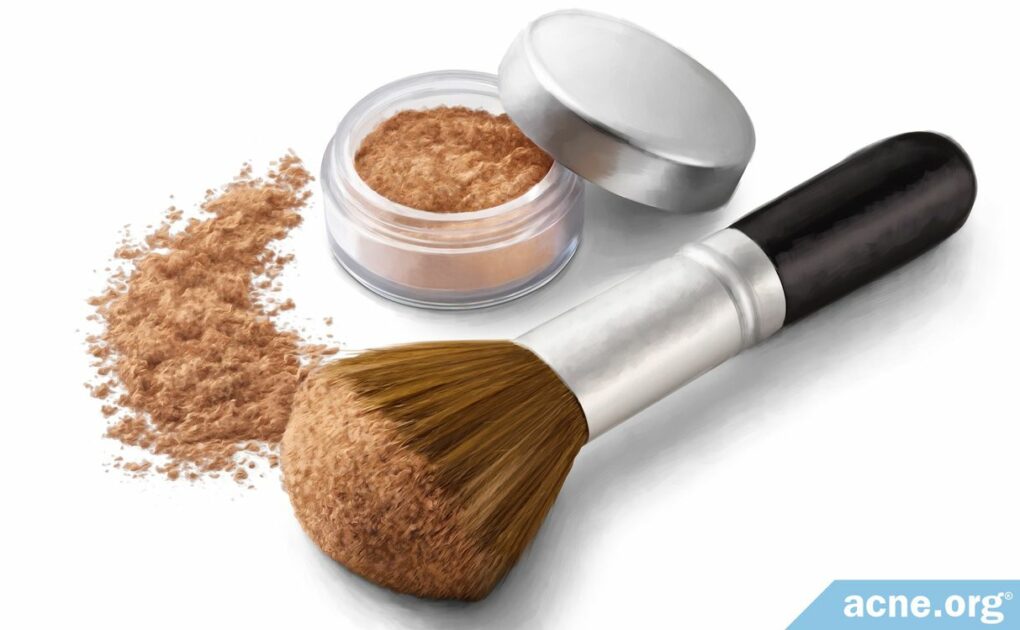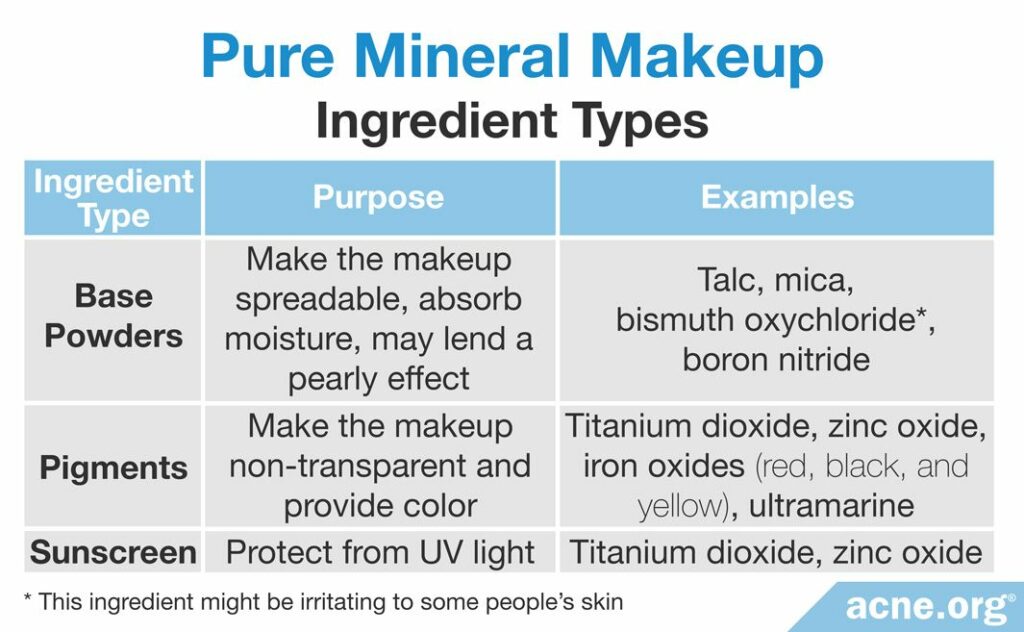Pure Mineral Makeup Is Usually Safe for Acne-prone Skin, but Not All So-called “Mineral” Makeup Is Actually Pure. The Bottom Line Is That You Have to Look at the Ingredients.

The Essential Info
Pure mineral makeup consists only of minerals and is typically safe for acne.
However, many manufacturers market so-called “mineral” makeup that contains additional ingredients, some of which can be pore-clogging and/or irritating to the skin.
The Bottom Line: When purchasing mineral makeup, try to find pure mineral makeup. Other “mineral makeup” products that contain additional ingredients may also be safe, but the key is to look for products free of pore-clogging ingredients, fragrances, and any substances that you may be allergic to. In addition, consider avoiding makeup containing bismuth oxychloride, which may cause irritation and itch in some people.

The Science
- The Argument for Mineral Makeup
- The Argument Against Mineral Makeup
- Guidelines for Choosing Mineral Makeup for Acne-prone Skin
- List of Common Comedogenic Ingredients in Makeup
- Tips for Using Mineral Makeup on Acne-prone Skin
All makeup contains some minerals, which are necessary for makeup to have color. Pure mineral makeup is makeup that consists only of minerals. In other words, true mineral makeup does not contain any fragrances, water, oils, waxes, or preservatives–just minerals.1,2
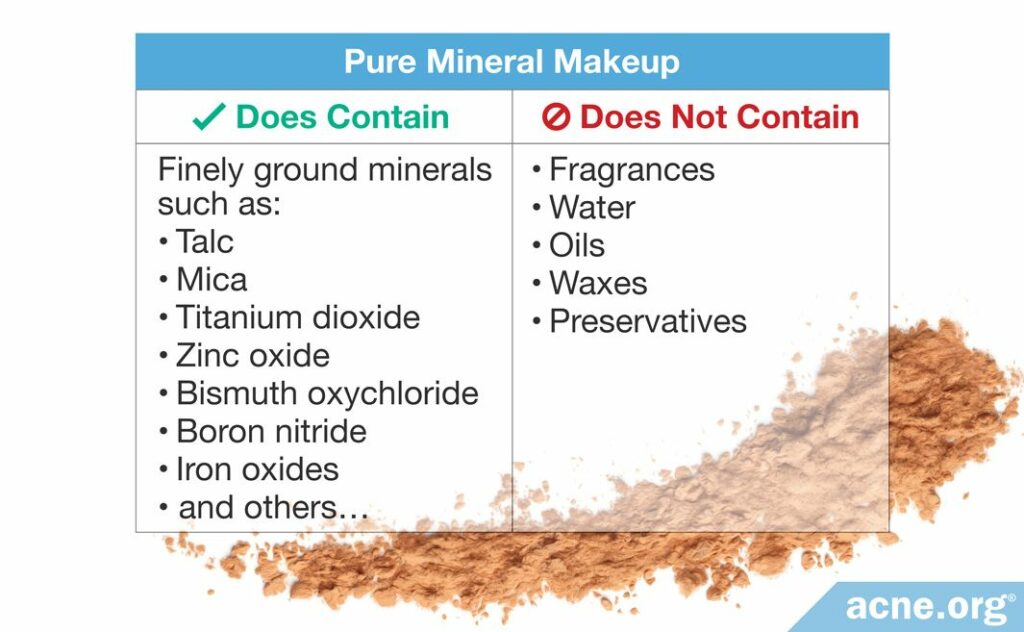
Since pure mineral makeup only contains dry solids, it usually comes in the form of loose or pressed powders.1,2
However, many manufacturers today use the term “mineral makeup” to market a variety of products. For example, some liquid foundations are labeled “mineral,” but in addition to minerals, they also contain water, silicone oils, plant extracts, and fragrances. In other words, some so-called mineral makeup products are not that different from conventional makeup.
Any makeup product that contains water, which includes most liquid makeups, must also contain preservatives to prevent bacteria and mold from growing in the water.3 So anytime you see a liquid makeup product labeled “mineral,” keep in mind that it is not pure mineral makeup.
Many manufacturers have claimed that mineral makeup is better for acne-prone skin than conventional makeup. No research studies have tested this claim, but when it comes to pure mineral makeup, there may be some truth to this idea. Let’s look at the arguments for and against mineral makeup for acne-prone skin.
The Argument for Mineral Makeup
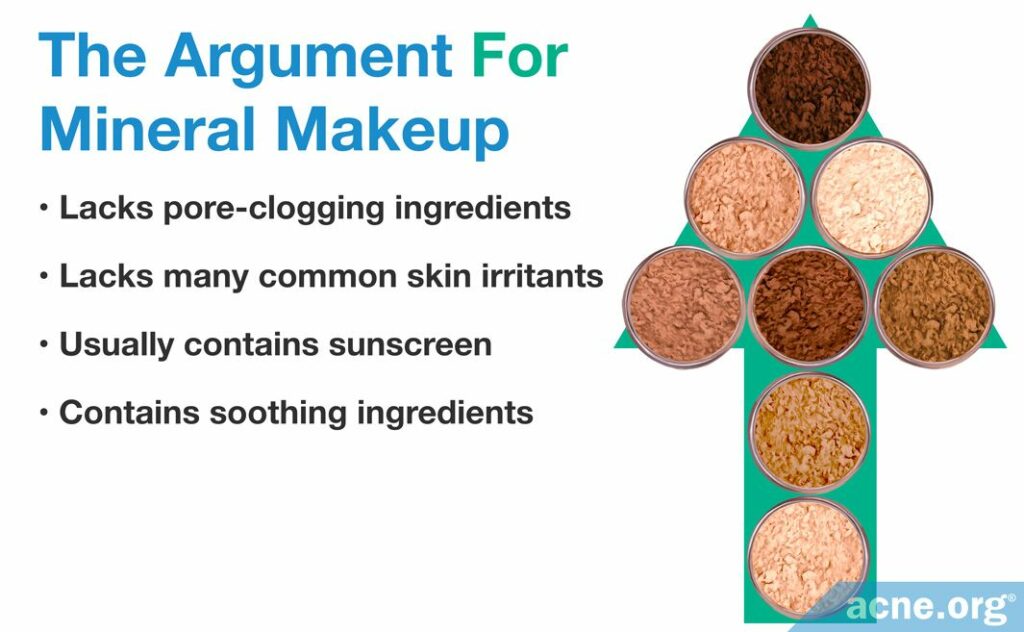
- Mineral makeup lacks pore-clogging ingredients: Pure mineral makeup rarely contains comedogenic (pore-clogging) ingredients.
- Mineral makeup lacks many common skin irritants: Pure mineral makeup does not contain fragrances or preservatives, which are common in conventional makeup and may cause skin irritation in some people. Skin irritation can trigger or aggravate acne, so it is always a good idea to avoid products with irritating ingredients.
- Mineral makeup usually contains sunscreen: Protecting the skin from the sun’s rays is a good idea, and it is especially important for people with acne. Besides causing sunburn, excessive sun exposure can increase so-called post-inflammatory hyperpigmentation (darkening of acne lesions after they heal). Mineral makeup usually contains titanium dioxide and/or zinc oxide, which are so-called physical sunscreens. In other words, mineral makeup often includes built-in sun protection. However, the level of sun protection you get from mineral makeup depends on how much titanium dioxide and/or zinc oxide is in the makeup, and how much makeup you put on. You can find out how much sun protection you can expect from a makeup product by checking its label. Look for an SPF (sun protection factor) of 15 or higher to ensure adequate sun protection for your skin. If your mineral makeup does not have an SPF number on its label, do not assume that it will act as a sunscreen.
- Mineral makeup contains soothing ingredients: Some research suggests that zinc oxide, an ingredient of many mineral makeup products, can be soothing to the skin.4,5 According to a review which summarized results from clinical trials, topical or oral zinc may be a promising alternative to other acne treatments.4 A personal note: I have always found that topical zinc oxide is unsafe for the people who I coach to get clear. Normally, in my admittedly anecdotal experience, when people who are acne-prone use zinc oxide sunscreen in particular, they tend to break out. Oral zinc, on the other hand, may help.
The Argument Against Mineral Makeup
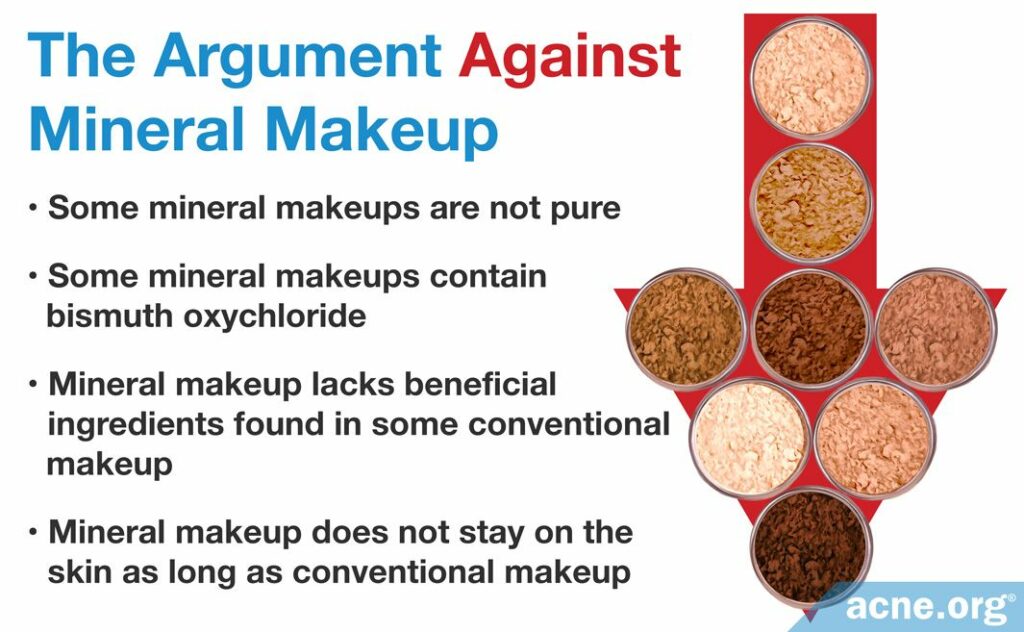
- Some mineral makeups are not pure: While pure mineral makeup normally does not contain comedogenic ingredients, fragrances, or preservatives, many so-called “mineral” makeup products on the market today do include such ingredients. In other words, the label “mineral makeup” does not guarantee that a particular product is safe for acne-prone skin.
- Some mineral makeups contain bismuth oxychloride: Bismuth oxychloride, a pigment that creates a shimmery effect, is a common ingredient in both mineral and conventional makeup.6 However, mineral makeup tends to contain this ingredient in larger amounts. Although bismuth oxychloride is an FDA-approved makeup ingredient,7 many people have anecdotally reported that this ingredient caused skin irritation and itch. This is a concern because anything that irritates the skin can trigger or intensify acne. More research is needed to confirm these reports, but in the meantime, it might be best to avoid makeup with bismuth oxychloride, especially if you find that your skin is sensitive to it.8 A good rule of thumb here is that if any makeup makes you itch, choose a different makeup.
- Mineral makeup lacks beneficial ingredients found in conventional makeup: Many conventional makeup products include ingredients that may be beneficial for the skin, such as moisturizers, antioxidants, and plant extracts. Some conventional makeup products made specifically for acne-prone skin contain salicylic acid, which may cause a slight improvement in acne. Mineral makeup rarely contains these beneficial ingredients.
- Mineral makeup does not stay on the skin as long as conventional makeup: Mineral makeup lacks binders, which are ingredients that help makeup to stay on the skin. Conventional makeup usually includes these ingredients and is therefore more durable.
To sum up, mineral makeup is not necessarily better for acne-prone skin. Either mineral or conventional makeup can be a safe choice: it all depends on the particular product and its ingredients.
To find a mineral makeup product that is safe for your skin, follow these guidelines:
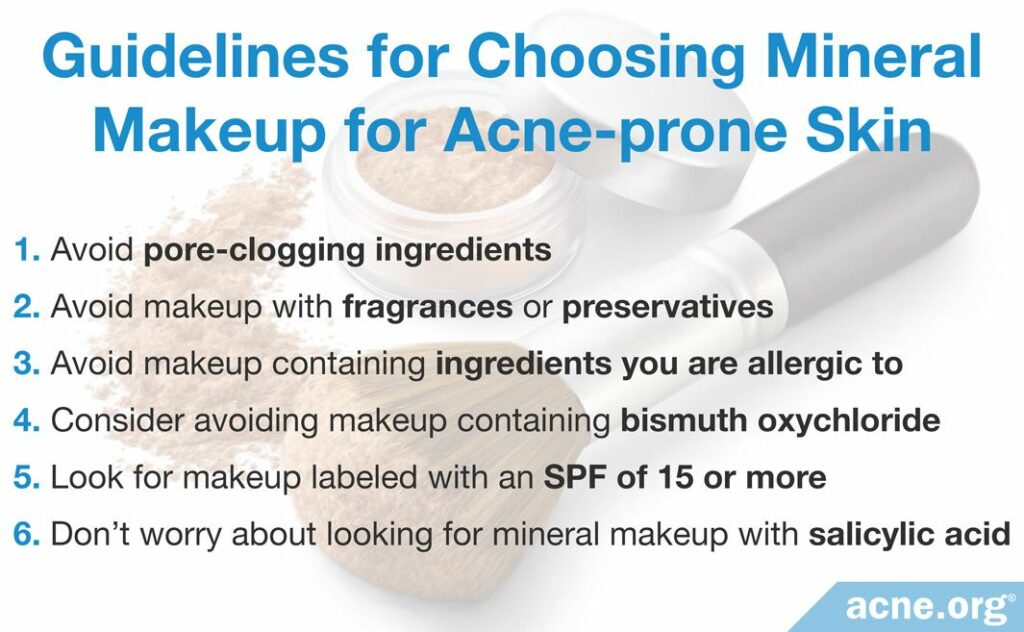
Guidelines for Choosing Mineral Makeup for Acne-prone Skin
- Avoid pore-clogging ingredients: Before buying any makeup product, always check the ingredient list. Avoid makeup with comedogenic (pore-clogging) ingredients. The table below in this article provides a comprehensive list of common comedogenic ingredients.
- Avoid makeup with fragrances or preservatives: Pure mineral makeup does not contain fragrances or preservatives, but some so-called mineral makeup products do. Fragrances are the ingredient most likely to cause allergies or to irritate your skin, which can make acne worse. Preservatives can also trigger allergies. If you are looking for a pure mineral makeup, your best bet is to select one without these ingredients.
- Avoid makeup containing ingredients you are allergic to: If you have known allergies to makeup ingredients, avoid products with those ingredients. If you suspect you may be allergic to a product, but are not sure, you can perform a patch test. Place a small amount of product on an inconspicuous patch of skin (the inner elbow is a good choice) and wait several hours to see whether you experience skin irritation or itching.
- Consider avoiding makeup containing bismuth oxychloride: While there is no hard evidence that bismuth oxychloride irritates the skin, anecdotal reports from multiple consumers suggest that it may lead to irritation and itch. Irritating acne-prone skin is a recipe for making acne worse, and if your skin is itchy, you are likely to scratch it and irritate it further. If you find that your skin is sensitive to bismuth oxychloride, consider avoiding makeup with this ingredient. I will continue to monitor the research and update these guidelines if hard data become available.
- Look for makeup labeled with an SPF (sun protection factor) of 15 or more: Mineral makeup usually contains titanium dioxide and/or zinc oxide, both of which have sunscreen properties. However, do not assume that all mineral makeup can be an effective sunscreen. Look for products that clearly indicate an SPF of 15 or more on the label. If you are only wearing a small amount of mineral makeup, your makeup may not provide sufficient sun protection, so it may be a good idea to apply a separate broad-spectrum sunscreen before putting on makeup.
- Do not worry about looking for mineral makeup with salicylic acid: Some makeup contains salicylic acid, an active ingredient that is somewhat beneficial for acne-prone skin. However, most mineral makeup products do not include salicylic acid. Even if you find “mineral makeup” with this ingredient, the concentration of salicylic acid in it will be 2% or less. Such a small amount of salicylic acid is unlikely to make much of a difference to your acne. Do not worry about trying to find mineral makeup with salicylic acid.
Whenever you are considering buying a makeup product, look at the label to make sure it does not contain the following comedogenic ingredients.
List of Common Comedogenic Ingredients in Makeup
Many research studies have investigated how likely various ingredients are to cause comedones (clogged pores).9 Based on a thorough review of this research, my team of doctors and I have compiled two lists:
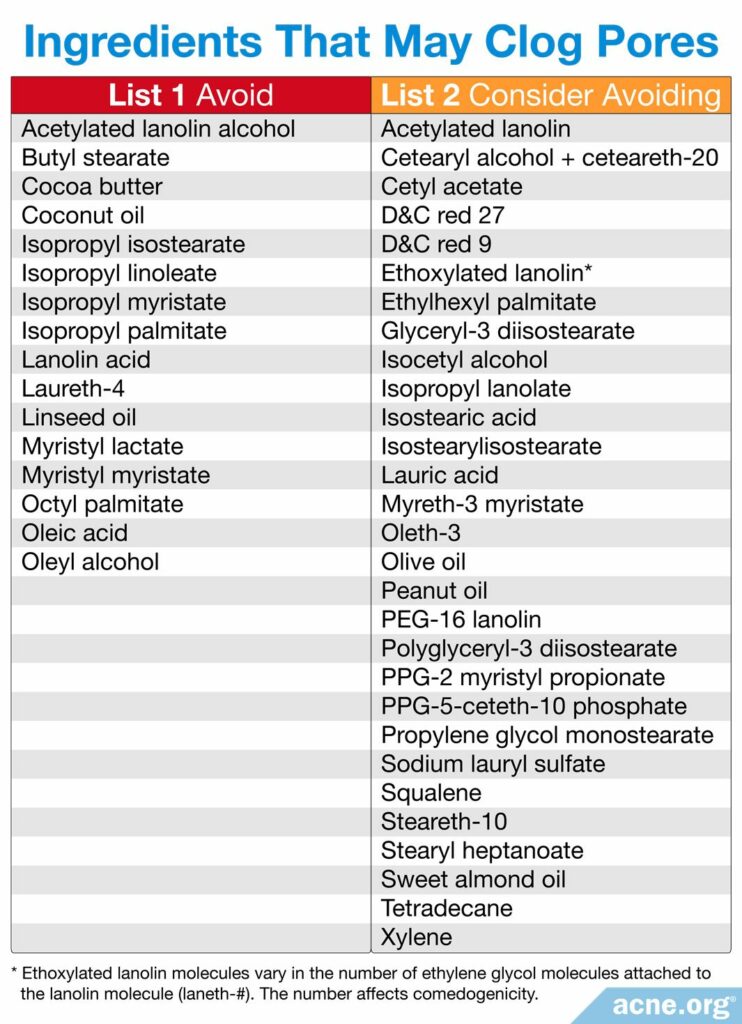
- Avoid: These are ingredients that people with acne-prone skin should definitely avoid, because a solid body of evidence shows that they are comedogenic.
- Consider avoiding: These are ingredients that people with acne-prone skin may want to consider avoiding, because some evidence indicates that they might be comedogenic.
Tips for Using Mineral Makeup on Acne-prone Skin
Whenever you apply mineral makeup to acne-prone skin, the most important thing is to avoid irritating the skin, because physical irritation of the skin can make acne worse. Acne-prone skin is also more prone to infections, so good hygiene is essential to prevent skin infections. When you use mineral makeup on acne-prone skin, keep these tips in mind:
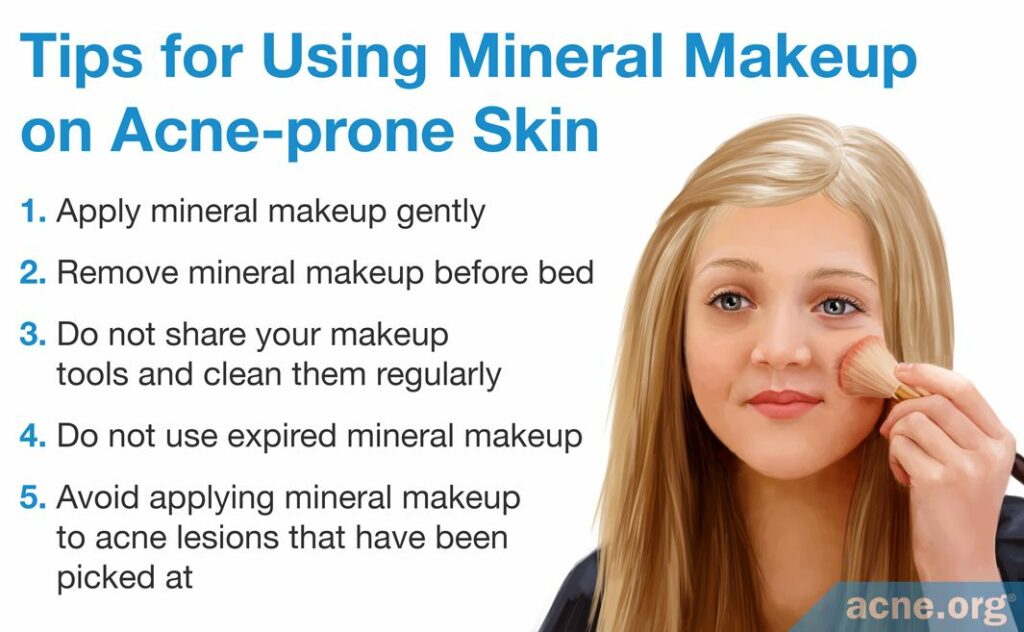
- Apply mineral makeup gently: Select the softest makeup brushes or powder puffs and apply mineral makeup very gently so as not to irritate the skin.
- Remove mineral makeup before bed: The skin is more vulnerable at night, so it is important to remove mineral makeup, or any other makeup, before going to bed. Remove makeup gently to avoid irritating your skin.
- Do not share your makeup tools and clean them regularly: Do not share your makeup brush or powder puff with anyone. Research shows that sharing makeup tools increases your chances of contracting a skin infection. Use disposable tools or clean your tools regularly to prevent the growth of bacteria and mold.
- Do not use expired mineral makeup: Pure mineral makeup consisting only of dry minerals should theoretically last forever. However, some so-called mineral makeup products contain non-mineral ingredients and may expire. Expired makeup is more likely to harbor bacteria and mold. Therefore, check your mineral makeup for expiration dates, and do not use any products that have expired.
- Avoid applying mineral makeup to acne lesions that have been picked at: Picking at an acne lesion turns it into a tiny open wound. Some research suggests that placing mineral makeup on top of such wounds can lead to increased inflammation, which would likely cause an acne flare-up.10 Avoid areas with picked lesions or open cuts when you apply mineral makeup.
